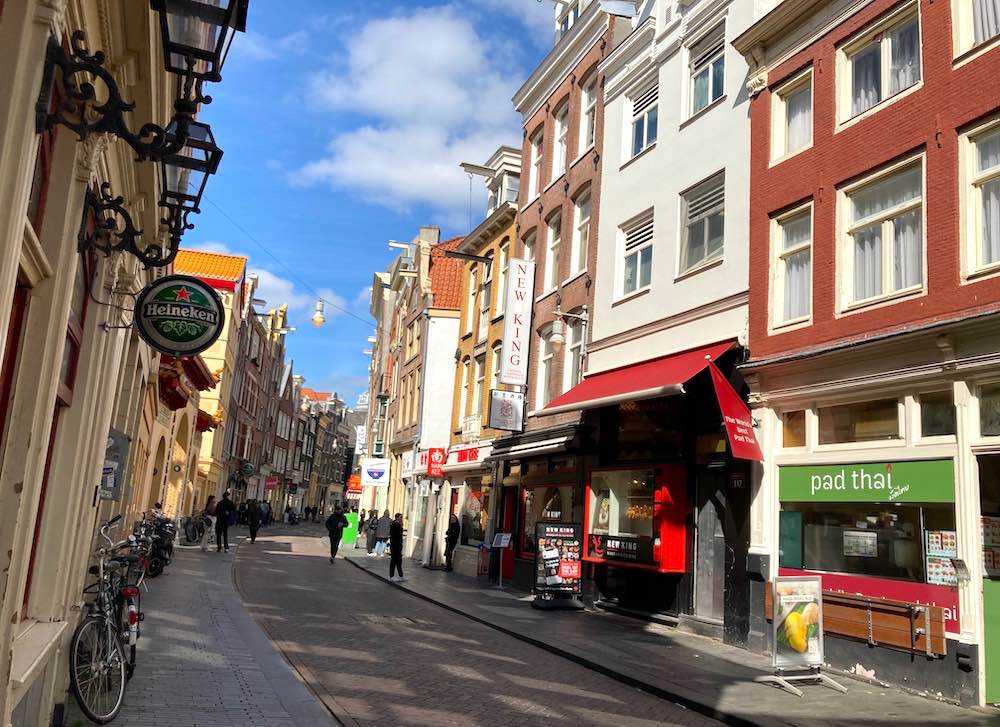Exploring Amsterdam Zeedijk: Uncover Hidden Gems in the Heart of the City
Posted on: januari 1, 2025

Amsterdam Zeedijk – The Ultimate Guide
Discover the hidden gem of Amsterdam Zeedijk, a street bursting with history, culture, and culinary delights.
Often overlooked by tourists, Zeedijk offers an authentic slice of Amsterdam life, from its historic roots as a 13th-century dike to today’s vibrant melting pot of flavors and experiences.
In this ultimate guide, uncover why this Dutch street is a must-visit destination, promising an unforgettable journey through the heart of Amsterdam’s rich heritage and dynamic present.
Amsterdam Zeedijk History

Zeedijk, one of Amsterdam’s oldest streets, is steeped in history. Originating in the 13th century as a dike to protect the city from the sea, it has evolved significantly over the centuries.
In the 17th and 18th centuries, Zeedijk was a prosperous street with elegant houses and a bustling port. However, by the 20th century, it became known for its nightlife and, less glamorously, as a center for crime and drugs.
Since the late 20th century, the area has undergone significant regeneration, transforming it into a vibrant and safe neighborhood. The street’s history reflects the broader societal changes in Amsterdam, making it a fascinating case study of urban evolution.
Culinary Scene

Zeedijk is a paradise for food lovers, offering a delightful array of dining options. The street is renowned for its Chinese restaurants, owing to its proximity to Amsterdam’s Chinatown. Visitors can enjoy authentic Asian cuisine, ranging from dim sum to Indonesian rijsttafel. The culinary scene is not limited to Asian flavors, however; there are also plenty of cafes and bistros serving traditional Dutch snacks, like bitterballen and stroopwafels, alongside international dishes. This melting pot of cuisines makes Zeedijk a perfect destination for foodies looking to explore a variety of tastes in one lively location.
Shopping and Local Businesses
Beyond its culinary delights, Zeedijk is also known for its eclectic mix of shops and businesses. The street is a haven for shoppers looking for unique finds, from vintage clothing and second-hand books to artisanal crafts and specialty food items.
Small, independently-owned shops give this street a charming and authentic character, distinguishing it from more commercial shopping areas in Amsterdam. Browsing these shops, visitors can find one-of-a-kind items that make perfect souvenirs or gifts, all while supporting local businesses.
Amsterdam Zeedijk Bars
Most bars on Zeedijk generally open in the late morning or early afternoon and close around 1 AM on weekdays and 3 AM on weekends, but it’s always a good idea to check the specific hours of your chosen venue in advance. The area is easily accessible by public transport: the nearest metro station is Nieuwmarkt, which is just a few minutes’ walk away, offering convenience for those exploring the city. Additionally, several tram lines, including lines 4, 14, and 24, have stops close to Zeedijk, further simplifying access to this lively street.
For visitors arriving from Amsterdam Central Station, Zeedijk is just a short walk away. Head southeast from the station, crossing the Prins Hendrikkade, and you’ll find yourself on the northern end of Zeedijk within approximately a 10-minute walk. This easy accessibility makes Zeedijk a must-visit destination for anyone looking to immerse themselves in the local culture and enjoy a night out in Amsterdam. Whether you’re in the mood for a quiet drink in a cozy setting or a night of lively conversation and meeting new people, Zeedijk’s bars have something to offer for every taste.
- Proeflokaal de Ooievaar
- In ‘t Aepjen
- Het Elfde Gebod
- Bottle & Jars
- De Roode Laars
- Casablanca
- San Fransisco
- Cafe Zilt
- Cafe ‘t Mandje
- Cafe Oost-West
- Cafe De Zeemeeuw
- Cafe De Zon
- Cafe De Kroegtijger
Cultural Attractions and Landmarks
Zeedijk is not just about food and shopping; it’s also rich in cultural heritage. The street is home to the Fo Guang Shan He Hua Temple, the largest Buddhist temple in Europe, which adds a unique architectural and spiritual dimension to the area. Additionally, Zeedijk boasts well-preserved historic buildings, some of which date back to the Dutch Golden Age, offering a glimpse into the city’s past. Walking down this street in Amsterdam is like taking a step back in time, as you encounter these landmarks amidst the modern buzz of the city.
Visitor Information & Tips
For those planning to visit Zeedijk, a few tips can make the experience more enjoyable. The best time to visit is during the daytime or early evening when the street is most lively and all shops and restaurants are open. Public transport is a convenient way to reach Zeedijk, with several tram and bus stops nearby. Visitors should be aware of their surroundings, as with any busy urban area, but the neighborhood is generally safe and welcoming. To fully experience the charm of Zeedijk, take your time to explore the side streets and alleys, where many hidden gems are waiting to be discovered.
Amsterdam Zeedijk Things to do
In the heart of Amsterdam, where the vibrant Zeedijk stretches its historical and cultural roots, lies an equally intriguing aspect of the city’s diverse character – the infamous Red Light District. Our app offers an immersive Red Light District tour, seamlessly blending the historical allure of Zeedijk with the contemporary intrigue of the district. Moreover, for those interested in the allure of Amsterdam’s nightlife, we provide exclusive access to the most sought-after adult shows at Moulin Rouge.
Experience the best of both worlds, from the quaint charm of Zeedijk to the electrifying entertainment of the Red Light District and Moulin Rouge. Secure your experience with the best online tickets available on our site, and dive into an Amsterdam adventure that tantalizes all your senses.
Veel Gestelde Vragen
What is Zeedijk known for?
Zeedijk is renowned for its rich history, vibrant culinary scene, unique shopping experiences, cultural landmarks, and as a part of Amsterdam’s Chinatown. It’s a popular destination for both tourists and locals, offering a diverse array of dining options, shopping, and historical attractions.
Can you find traditional Dutch food on Zeedijk?
Yes, Zeedijk offers a variety of traditional Dutch food options. Among its international cuisine offerings, many cafes and bistros serve classic Dutch dishes and snacks, such as bitterballen, herring and stroopwafels, allowing visitors to enjoy the local flavors of the Netherlands.
Is Zeedijk safe for tourists?
Zeedijk is generally safe for tourists. It has undergone significant regeneration and is now a lively and welcoming area. However, as with any busy urban environment, visitors are advised to stay aware of their surroundings, especially at night.
Are there any cultural landmarks on Zeedijk?
Yes, Zeedijk is home to several cultural landmarks. Notable among them is the Fo Guang Shan He Hua Temple, the largest Buddhist temple in Europe. Additionally, the street is lined with historic buildings that reflect Amsterdam’s rich architectural heritage.
What is the best time to visit Zeedijk?
The best time to visit this street is during the daytime or early evening. This is when the street is most vibrant, with all shops, restaurants, and attractions open and bustling with activity.
How do you get to Zeedijk?
Zeedijk is easily accessible by public transport. It’s well-connected with several tram and bus stops nearby. Alternatively, it’s a short and pleasant walk from Amsterdam Central Station, making it convenient for visitors to reach from different parts of the city.
How old is the Zeedijk?
Zeedijk is one of Amsterdam’s oldest streets, dating back to the 13th century. Originally built as a dike to protect the city from the sea, it has played a significant role in Amsterdam’s history for over 700 years, witnessing many transformations throughout the centuries.
How long is the Zeedijk?
Zeedijk stretches approximately 1 kilometer (about 0.62 miles) in length. It runs from the Prins Hendrikkade near Amsterdam Central Station to Nieuwmarkt Square and The Waag. This relatively short distance is packed with a rich array of shops, restaurants, and cultural landmarks, making it a dense and vibrant area to explore.



